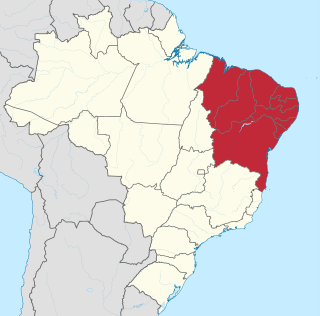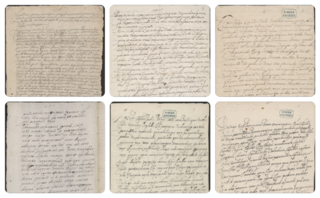
Paraíba is a state of Brazil. It is located in the Brazilian Northeast, and it is bordered by Rio Grande do Norte to the north, Ceará to the west, Pernambuco to the south and the Atlantic Ocean to the east. Paraíba is the third most densely populated state of the Northeast; João Pessoa, the sea-bordered state capital, and Campina Grande, in the interior, rank among the fifteen-largest municipalities in the Northeast of Brazil. The state is home to 1.9% of the Brazilian population and produces 0.9% of the Brazilian GDP and it is divided into 223 municipalities.

Tupinambis is a lizard genus which belongs to the family Teiidae and contains eight described species. These large lizards are commonly referred to as tegus. T. merianae, T. rufescens, and T. teguixin are popular in the pet trade. They are primarily found in South America, although T. teguixin also occurs in Panama.

The Northeast Region of Brazil is one of the five official and political regions of the country according to the Brazilian Institute of Geography and Statistics. Of Brazil's twenty-six states, it comprises nine: Maranhão, Piauí, Ceará, Rio Grande do Norte, Paraíba, Pernambuco, Alagoas, Sergipe and Bahia, along with the Fernando de Noronha archipelago.

Copa do Nordeste, also known as Campeonato do Nordeste or Copa Nordeste is a Brazilian football competition among Northeastern region teams. It is sometimes informally referred to as Lampions League – in reference to the UEFA Champions League and bandit folk hero Lampião.

D. Antônio Filipe Camarão was an Indigenous soldier from the Potiguara tribe near the Rio Grande do Norte area of the Portuguese colony of Brazil. His original tribal name was Poti, which means "prawn". He was born in the neighbourhood of Igapó, in Natal, or, according to some other historians, in the state of Pernambuco, or in Aldeia Velha.

Iracema is one of the three indigenous novels by José de Alencar. It was first published in 1865. The novel has been adapted into several films.

The Potiguara are an indigenous people of Brazil. The Potiguara people live in Paraíba, in the municipalities of Marcação, Baía da Traição and Rio Tinto. Their population numbers sixteen thousand individuals, who occupy 26 villages in 3 reservations : Potiguara, Jacaré de São Domingos e Potiguara de Monte-Mor. Their name, Potiguara, means "shrimp-eaters", from poty, "shrimp", and uara, "eater", according to Brazilian writer José de Alencar.
José Cândido Sotto Maior, usually known as Candinho, is a Brazilian football manager.

Huamoé (Wamoe) a.k.a.Uamué, Uman, or Atikum, is an extinct language of Brazil that is too poorly attested to classify. The Pankararú language is spoken just to the south.
Tuxá was the eastern Brazilian language of the Tuxá people, who now speak Portuguese. The language ceased being spoken in the late 19th century, but in the 1960s a research team found two women that had been expelled from the Tuxa tribe in Bahia who knew some thirty words.
Pankararú is an extinct language of eastern Brazil. There are 6,000 ethnic Pankararú, but they all speak Portuguese. In 1961, only two elders could remember anything of the language. Today, they live in Brejo dos Padres and other villages of Tacaratu, Pernambuco State. The language was originally spoken between the Moxotó River and the Pajeú River.
Natú is an extinct language of eastern Brazil. It was originally spoken on the Ipanema River in the Cariri area near present-day Porto Real do Colégio.
The CBF Rankings are football rankings produced by the CBF, the Brazilian Football Confederation. The Ranking Nacional de Federações determines how many berths each state federation receives in Copa do Brasil, Campeonato Brasileiro Série D, Copa do Nordeste and Copa Verde. The Ranking Nacional de Clubes is a ranking of clubs and is used to determine the allocation of clubs in the pots for the draws of Copa do Brasil and Copa do Nordeste as well as was used until 2023 to determine the 10 extra participants of Copa do Brasil.
The 2014 Copa do Nordeste was the 11th edition of the main football tournament featuring teams from the Brazilian Nordeste. The competition featured 16 clubs, with Bahia and Pernambuco having three seeds each, and Ceará, Rio Grande do Norte, Sergipe, Alagoas and Paraíba with two seeds each. The 2014 Copa do Nordeste did not feature teams from the states of Maranhão and Piauí, though they are slated to enter the tournament in its 2015 edition. The champions, Sport Recife, earned a berth in the 2014 Copa Sudamericana.
The 2019 Copa do Nordeste was the 16th edition of the main football tournament featuring teams from the Brazilian Northeast Region. The competition featured 16 clubs, with Bahia, Ceará and Pernambuco having two seeds each, and Rio Grande do Norte, Sergipe, Alagoas, Paraíba, Maranhão and Piauí with one seed each. Four teams were decided by a qualifying tournament.
The 2020 Copa do Nordeste was the 17th edition of the main football tournament featuring teams from the Brazilian Northeast Region. The competition featured 16 clubs, with Bahia, Ceará and Pernambuco having two seeds each, and Rio Grande do Norte, Sergipe, Alagoas, Paraíba, Maranhão and Piauí with one seed each. Four teams were decided by a qualifying tournament. The tournament began on 21 January and ended on 4 August.
Claudett de Jesus Ribeiro OMC is a Brazilian geographer and public administrator. In 2011, she was awarded the Ordem do Mérito Cultural.
The 2021 Copa do Nordeste was the 18th edition of the main football tournament featuring teams from the Brazilian Northeast Region. The competition featured 16 clubs, with Bahia, Ceará and Pernambuco having two seeds each, and Rio Grande do Norte, Sergipe, Alagoas, Paraíba, Maranhão and Piauí with one seed each. Four teams were decided by a qualifying tournament. The Copa do Nordeste began on 27 February and ended on 8 May.
The 2022 Copa do Nordeste was the 19th edition of the main football tournament featuring teams from the Brazilian Northeast Region. The competition featured 16 clubs, with Bahia, Ceará and Pernambuco having two seeds each, and Alagoas, Maranhão, Paraíba, Piauí, Rio Grande do Norte and Sergipe with one seed each. Four teams were decided by a qualifying tournament. The Copa do Nordeste began on 22 January and ended on 3 April 2022. Bahia were the defending champions, but were eliminated in the group stage.

Camarão Indians' letters, also known as Tupi letters from Camarão Indians, are a series of six letters exchanged between Potiguara Indians during 1645, in the first half of the 17th century, in the context of the Dutch invasions of Brazil. They are the only known texts written by Brazilian Indians until the Independence of Brazil. The Camarão Indians' letters are also the only record of Old Tupi writing in Colonial Brazil. Today, the correspondence is stored in the archives of the Royal Library of the Netherlands, and has been preserved there for almost 400 years.









